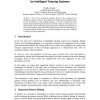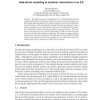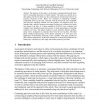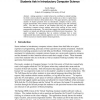EDM
2008
14 years 27 days ago
2008
One of the unresolved problems faced in the construction of intelligent tutoring systems is the acquisition of background knowledge, either for the specification of the teaching st...
EDM
2008
14 years 27 days ago
2008
This paper discusses our approach to building models and analyzing student behaviors in different versions of our learning by teaching environment where students learn by teaching ...
EDM
2008
14 years 27 days ago
2008
This paper presents the development of two related machine-learned models which predict (a) whether a student can answer correctly questions in an ILE without requesting help and (...
EDM
2008
14 years 27 days ago
2008
In this paper we compare different data mining methods and techniques for classifying students based on their Moodle usage data and the final marks obtained in their respective cou...
EDM
2008
14 years 27 days ago
2008
Bayesian graphical models are commonly used to build student models from data. A number of standard algorithms are available to train Bayesian models from student skills assessment...
EDM
2008
14 years 27 days ago
2008
How can an automated tutor assess children's spoken responses despite imperfect speech recognition? We address this challenge in the context of tutoring children in explicit s...
EDM
2008
14 years 27 days ago
2008
We compare the purposes, inputs, representations, and assumptions of three methods to evaluate the fine-grained interactions of intelligent tutors with their students. One method i...
EDM
2008
14 years 27 days ago
2008
The purpose of this study is to develop a conceptual framework and a tool for measuring motivation of online learners. The study was carried out in three phases, the first of which...
EDM
2008
14 years 27 days ago
2008
Active engagement in the subject material has been strongly linked to deeper learning. In traditional teaching environments, even though the student might be presented with new con...
EDM
2008
14 years 27 days ago
2008
Asking questions is widely believed to contribute to student learning, but little is known about the questions that students ask or how to exploit them in tutorial interventions to...




